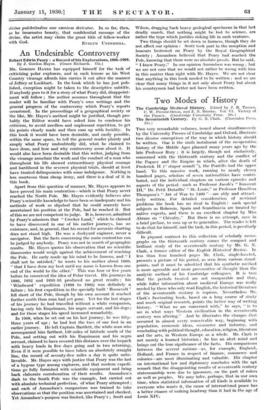An Undesirable Controversy
Robert Edwin Peary : a Record of his Explorations, 1886-1909.
Ma. GORDON HAYES has equipped himself for the task of criticizing polar explorers, and in such leisure as his West Country vicarage affords him carries it out after the manner of Jeffrey or Lockhart. In the book which he has just pub- lished, exception might be taken to the descriptive subtitle. If anybody goes to it for a story of what Peary did, disappoint- ment will follow ; the author assumes throughout that the reader will be familiar with Peary's own writings and the general progress of the controversy which Peary's reports occasioned. In the proceedings of a geographical society or the like, Mr. Hayes's method might be justified, though pro- bably the Editor would have asked him to condense his criticism, to avoid needless and unpleasant repetition, to get his points clearly made and then sum up with lucidity. In this book it would have been desirable, and easily possible, within the same space, to tell the general reader plainly and simply what Peary undoubtedly did, what he claimed to have done, and how and why controversy arose about it. It would also have been desirable that this writer, judging from the vicarage armchair the work and the conduct of a man who throughout his life showed extraordinarY physical courage and hardihood in the severest physical trials, should at least have treated delinquencies with some indulgence. Nothing is less courteous than cheap irony, and there is a deal of it in this book.
Apart from this question of manner, Mr. Hayes appears to have proved his main contention—which is that Peary never reached the North Pole. Mr. Hayes evidently believes also Peary's scientific knowledge to have been so inadequate and his methods of work so slipshod that he could scarcely have ascertained his position at the Pole, had he reached it. But of this we are not competent to judge. It is, however, admitted by Peary's admirers that " Crocker Land," which he claimed to have discovered in one of his earlier journeys, has no existence, and, in general, that his record for accurate charting does not stand high. He was a dockyard engineer, never a navigator. But the facts concerning the main contention can be judged by anybody. Peary was not in search of geographic results. Mr. Hayes quotes his observation that no scientific discoveries would weigh against the achievement of reaching the Pole. He early made up his mind to be famous, and " I shall not be satisfied," he wrote to his mother about 1880, "that I have done my best until my name is known from one end of the world to the other." This was four or five years before he conceived the idea of Polar travel. IIis journeys in 1886, 1892 and 1893-95 produced no great results ; his ' Windward' expedition (1898 to 1902) was definitely a failure ; his first expedition in the specially built Roosevelt' fell short of the Pole, though by his own account it reached further north than man had yet gone. Yet for the last stages of his journey he had travelled without a white companion, having only his Esquimaux, his negro servant, and his dogs ; and for these stages his speed increased remarkably.
In 1908, when he set out on his last journey, he was fifty- three years of age ; he had lost the toes of one foot in an earlier journey. He left Captain Bartlett, the white man who accompanied him farthest, 150 miles of latitude south of the Pole, and setting out with his Esquimaux and his negro servant, claimed to have covered this distance over the icepack with heavy loads in five days going and in two returning. Even if it were possible to have taken an absolutely straight line, the record . of seventy-five miles a day is quite unbe- lievable. Mr. Hayes says with justice that Peary was the last of a bygone type among explorers, and that modem expedi- tions go fully furnished with scientific equipment and bring back elaborate corroboration of their results. Amundsen's dash to the South Pole was the example, but carried out with absolute technical perfection, of what Peary attempted ; and each of Amundsen's companions was trained to take observations so that the position was ascertained and checked. Yet Amundsen's purpose was limited, like Peary's ; Scott and Wilson, dragging back heavy geological specimens in that last deadly march, that nothing might be lost to science, are rather the type which justifies risking life in such ventures.
Two things should be set down in fairness, though they do not affect our opinion : Scott took part in the reception and honours bestowed on Peary by the Royal Geographical Society ; Amundsen believed that Peary had reached the Pole, knowing that there were no absolute proofs. But he said, " I knew Peary." In our opinion Amundsen was wrong ; but we are not sure that we would not rather be wrong with him in this matter than right with Mr. Hayes. We are not clear that anything in this book needed to be written ; and we are clear that many things in it not only about Peary but about his countrymen had better not have been written.






































 Previous page
Previous page